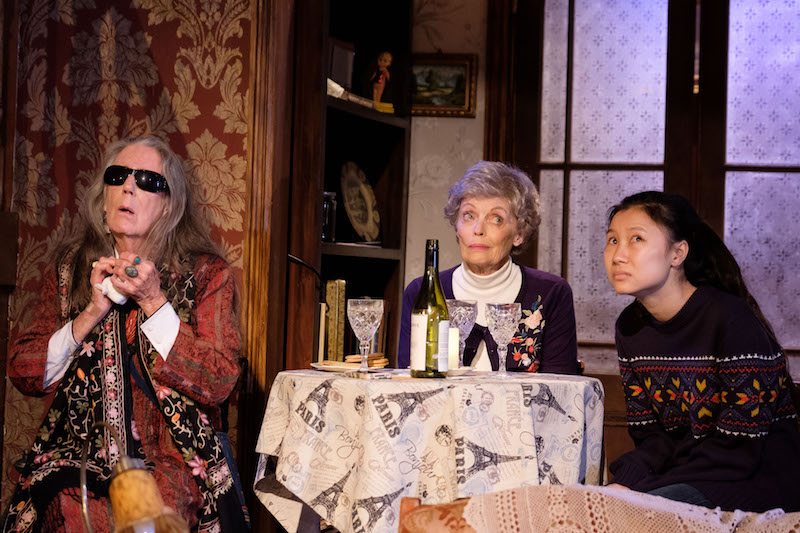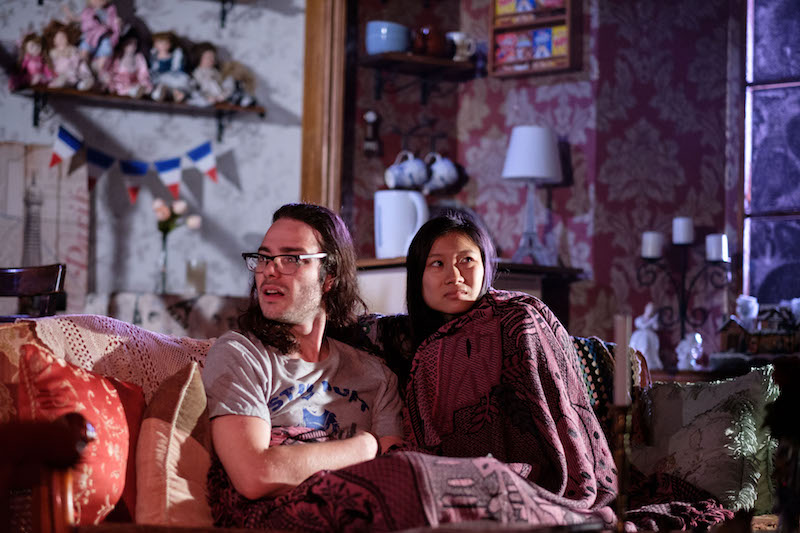The seductive slow-burn that American playwright Annie Baker employs in her hyper-naturalistic dramas has been compared to Chekhov. Not a great deal seems to happen on the surface, but beneath the sporadic, ambling conversations, full of silences and slightly awkward moments, she subtly conveys more and more about the characters. Very often it’s loneliness that she is revealing, along with jealousy and a deep-seated need for love.
Outhouse Theatre Co, an independent Sydney company, has already enjoyed considerable success with productions of two of her plays, both directed by Craig Baldwin: The Aliens, about three social misfits, set in the grungy backyard of a café in small-town Vermont, and The Flick, an ineffably tender play (which won the Pulitzer Prize for Drama in 2014) about three people working in a small, run-down cinema in Massachusetts.
Now Outhouse presents Baker’s 2015 play John, also directed by Baldwin, which has many of the same qualities as The Aliens and The Flick, but which also feels somewhat different given its rather gothic sense of mystery.
 Maggie Blinco, Belinda Giblin and Shuang Hu. Photograph © Clare Hawley
Maggie Blinco, Belinda Giblin and Shuang Hu. Photograph © Clare Hawley
The moment the red velvet curtain opens, we are intrigued. Designed in immaculate detail by Jeremy Allen, the naturalistic set features the quaint living room of a guest house in Gettysburg, Pennsylvania, located close to the American Civil War’s bloodiest battlefield. Owned by the pleasant, very welcoming Mertis Katherine Graven (Belinda Giblin), there are slightly scary looking dolls going up the staircase, and numerous lamps, candles and knick-knacks on every surface. There’s also a decorated Christmas tree festooned with lights, a group of garden gnomes, a piano and an illuminated jukebox that plays Bach. It all feels cosy, kitsch and slightly weird.
The play begins as a young New York couple – Elias Schrieber-Hoffman (James Bell) and his girlfriend Jenny Chung (Shuang Hu) – arrive for a few days’ break. He has always been interested in the Civil War and wants to visit the local sights, though it’s quickly clear that their relationship is in trouble.
The rooms upstairs which we don’t see (though we can hear the couple talking up there on occasion) are named after Civil War generals. Mertis (or “Kitty”) has put them in a different room to the one they booked because, she says, it has a leak.
Finding their room too cold to sleep in, Jenny comes downstairs in the middle of the night and can’t help feeling disturbed by the Samantha doll sitting on a ledge on the wall; it’s exactly the same as one she had as a child which she was always convinced was angry with her. And then without warning the piano starts to play on its own.
Mertis’s good friend Genevieve Marduk (Maggie Blinco) is convinced the house is haunted. Genevieve, who is blind, cantankerous, eccentric and dryly funny, maintains she once went mad when her ex-husband took possession of her soul and tried to destroy her. When Jenny spends an afternoon with Mertis and Genevieve (having left Elias to continue his sight-seeing alone because of her bad period pains) she discovers that Genevieve’s husband was called John – a name all too-familiar to Jenny, as we will discover.
Baker gives the audience plenty to consider from ghosts to characters side-stepping the truth. The writing is beautiful, feeling both authentically real yet magical at times as well. Just like Pinter, who was famous for his pauses, Baker uses them brilliantly to illustrate the awkward conversations of the characters, and to suggest things half-thought or left unsaid. Once again, loneliness, jealousy and insecurity ebb beneath the surface, with a desperate, moving need from the characters to connect with others.
John runs just over three hours with two intervals but it never feels long. Instead, we are drawn into the strange, fascinating world on stage. We constantly feel a little on edge, sensing that something creepy is just around the corner.
 James Bell and Shuang Hu. Photograph © Clare Hawley
James Bell and Shuang Hu. Photograph © Clare Hawley
Baldwin directs a precise, perfectly paced production, drawing fine performances from the cast of four. Giblin gives a beautifully pitched performance as Mertis, capturing her quaint, old-fashioned poise, her generosity, and an intelligence that seems at odds initially with her homeliness. She is, she says, a neo-Platonist and “a tiny bit of a mind reader”. She gives the character a quiet stillness, she listens and watches, she seems genuinely concerned about the two young people, and her smiles can be both warm and kindly, yet sometimes empty as if she is waiting for a response that hasn’t come.
Baldwin has her opening and closing the curtains at the beginning and end of each act, and also moving the hands on a grandfather clock to trace the marching of time –with one very funny moment where Mertis wakes up late.
Blinco is a formidable presence as Genevieve, generating an eccentricity and robust energy that works as a wonderful counterpoint to Mertis’s gentle gracefulness. Elias – who can’t help picturing his girlfriends as insects – is not the most likeable character but Bell captures his tetchy insecurity, driven by his suspicions of Jenny’s infidelity, and Hu is convincing as Jenny, who struggles to cope with Elias’s moodiness even though she may perhaps be deceiving him. Hu also finds just the right tone when revealing a mystical story about being embraced by the universe in New Mexico and realising that she felt “less alone in my alone-ness”.
Baker leaves you with many unanswered questions. Is the house haunted? Are we all surrounded by ghosts of the past? Is Mertis’s husband George really in the house? These and other questions leave you discussing the many ideas that Baker canvasses. It’s an intriguing play full of magic yet pervaded by sadness, and its elusive nature is part of its fascination.
John runs at the Reginald Theatre, Seymour Centre until October 12











Comments
Log in to join the conversation.